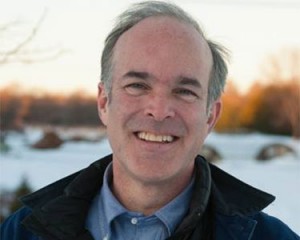No, Aaron Woolf, NCPR did not make your closing argument
The last week or so, Democrat Aaron Woolf has been making a lot of hay out of NCPR’s in-depth political profile of his opponent, Republican Elise Stefanik. This isn’t anything particularly new. Candidates often use press reports in their campaigns. One of our earlier reports was translated into a TV ad by Republican Matt Doheny in the GOP congressional primary.
But because Mr. Woolf has been leaning so heavily on that one single bit of journalism — blasting it to voters in paid Facebook spam and even making it the focus of interviews with journalists — it’s important for us to talk a bit about this and explain to our audiences the huge difference between what we’re doing and what the Democratic candidate is doing.
NCPR is charged with an overarching mission: We inform our audiences so that they can make their own decisions about things like who should represent the North Country in Congress. Yes, we reported that there are discrepancies between Ms. Stefanik’s portrayal of her life history and the record we were able to compile of her actual resume.
But we also found that her career has been an extraordinarily accomplished one for a political activist of any age, let alone one so young. We found that she enjoys the kinds of relationships and connections in Washington DC that may serve the North Country well, especially within a Republican majority, if she’s elected to the House.
In fact we have worked over weeks and months to offer a detailed, three-dimensional portrait of all three candidates in this important race. We haven’t played “gotcha.” We haven’t portrayed any of these candidates as white knights or villains.
Again, none of Aaron Woolf’s heavy-handed reliance on a single NCPR report, stripped of its nuance, is new. Politics is politics. While our job is to inform you, Mr. Woolf’s job is to convince voters to give him a second look, using any tool he can find.
But it’s still necessary for us to point out that we don’t approve. And in the end, we believe it’s always best for politicians to use their own words, their own arguments, their own policy proposals, to convince people that they deserve to win elections.
The one positive here is that it may lead some folks to examine our actual reporting in its totality. We hope you’ll do that. The truth is that we’re not making Aaron Woolf’s closing arguments, but we are offering people in the North Country a thorough, comprehensive, and compelling journalistic record.
We hope it will help you enter the ballot box a little bit better prepared. Click here to start reading.
Tags: election14, ny21, politics









It speaks volumes of Woolf’s campaign that his “closing argument” is based entirely on the alleged awfulness of his GOP opponent rather than a single positive thing about himself.
I never took your report as a “closing argument” for Aaron Woolf. It did present a pretty good case for choosing him over Elise Stefanic though. Had you intended it as a closing argument you might have followed up your observation that she had powerful connections in Washington by noting that while they could be used to serve the North Country well they could also be used to serve the interests of those who funded her (Carl Rove & Company). You did (wisely) refrain from that observation but I don’t have to so there it is.
I can see why you dont want to be thought of as taking sides. I also thought your description was quite fair to Ms Stefanik. But I can also see why Aaron Woolf would want everyone to be exposed to the real Stefanik but not in a balanced way. Cutting and pasting from your description is an obvious way to go. She has quite skillfully blurred her positions and her resume. That is good politics and to her credit. It is Mr Woolf’s job to clarify her biography as well as NCPR’s, but he doesn’t need to do in a fair and balanced manner.
Both candidates are out of touch, and nit what we need. I only hope people will wake up out of the apathy and sheep-mode and vote for Matt Funiciello.
Oh brother. Get over yourselves. I suppose Ben Bradley was aghast that people would take the totality of Nixon’s political career out of context after Watergate broke.
Well, you sure did make Woolf’s “closing argument” but it wasn’t a very compelling one. Brian MOFYC said it correctly.
Was this merely part of the prelude to the “closing argument”? Can you do better, I thought you did great but polls suggest Woolf needs you to raise bar.
si liceret ut alii nos ipsos
si is vultus amo anatem ut anates impudentesque ?
I think it would be unfair if Aaron had cherry picked things from what you said or misquoted you. I don’t think he did that. I think Stefanik’s elitist background of supporting George Bush’s policies and Paul Ryan’s proposals speaks for itself.